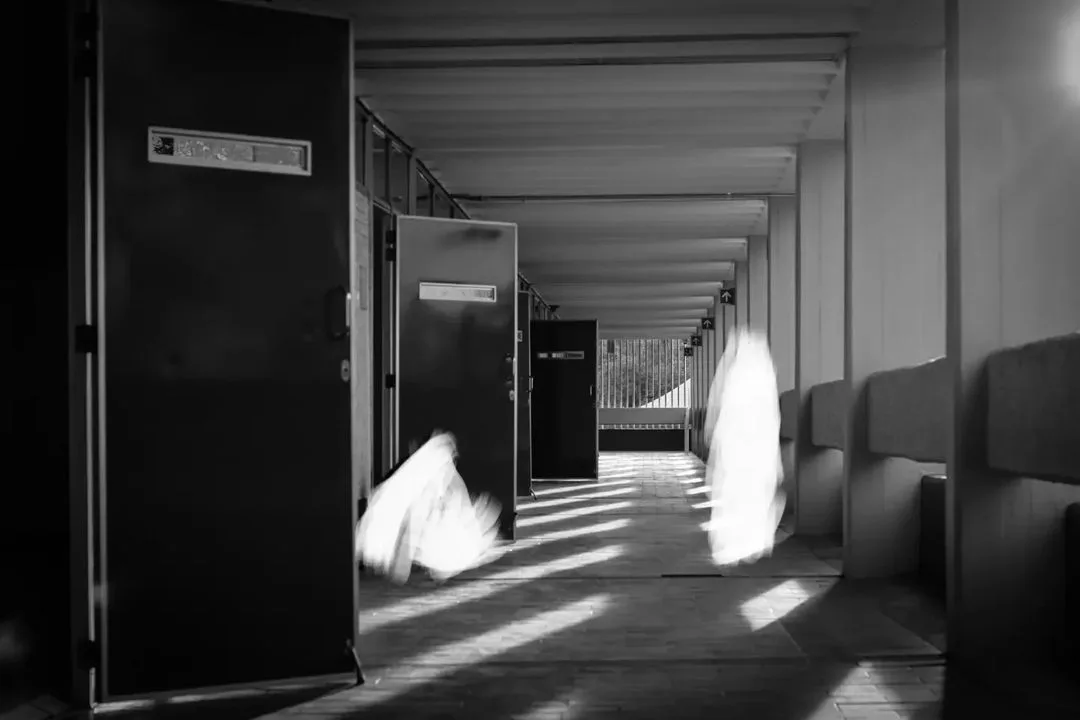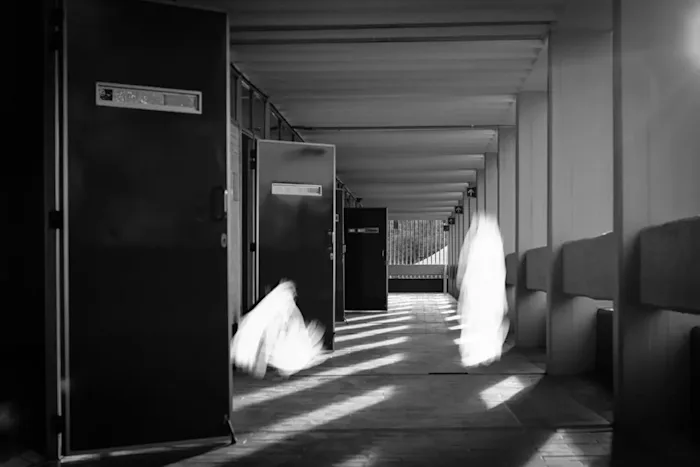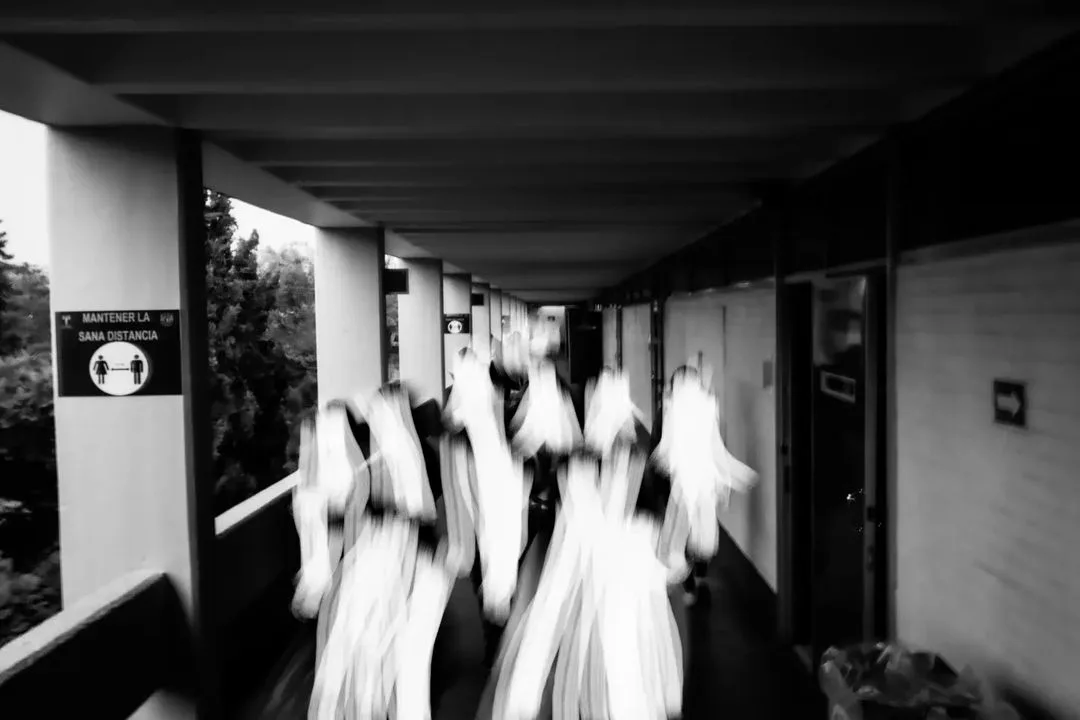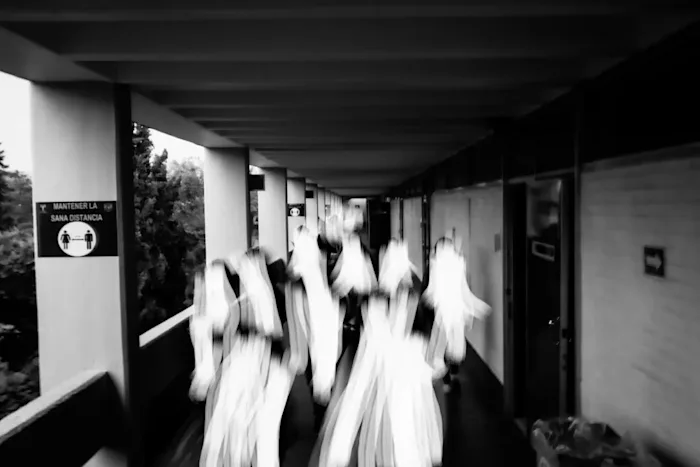The Student in the Night of Dispossession
Gerardo Muñoz
Other languages: Français
In the spring of 2021, a photo circulated widely in the press offered a point of entry into our epoch: it was a blurry, pixelated image of a Spanish student named Carlos Alegre, who was sitting on some remote corner of a street in Malaga reading his school notebook while waiting for food delivery orders from the Glovo company app (on the right side of the image, a delivery backpack hangs on his motorcycle). The image included no timestamp or location, and yet it gave spatial form to a gesture that must be considered fundamental: the student's withdrawal of his attention from the mystery of a temporality subsumed by the administration of value exchange. In a world that demands the suspension of our habits and our contact with other bodies, a vast gallery of social types has arisen whose aim is to suture and affix the psychosomatic energy of life: the "promoter," the "influencer," the "strategy consultant" and, as depicted in this photo, the "food delivery boy." These subjective figures — stripped of their language and habits, impoverished in experience and friendship — are nothing new; they merely confirm the death of Man through an intensified saturation of reality by cybernetics. The only subtlety in this ongoing process of domestication resides in the fact that the apparatus of "service" must struggle over the very existence of life itself, that is, by ensuring its radical non-existence. In an age of absolute acceleration and stagnation — the two vectors of force unleashed by the collapse of Fordism and the disappearance of the figure [Gestalt] of the worker — the only meaning of life that remains is catastrophic: literally anything could happen…anything except the possibility of freely taking hold of our own destiny.
This historical cleavage, together with the cybernetic convergence between man and machine, has rendered obsolete any of the modern consolations previously associated with political economy and its human community, as well as political representation or state authority. Everything that threatens to deviate from the regime of valorization must be rendered unusable and disposable. Carlos' equivocal posture that night in Malaga furnishes an image of our interregnum: his gaze, attentively directed towards the notebook, flees from a sinister and hellish reality. Indeed, the desert of nihilism that can be felt today throughout the metropolises of the West serves as a reminder that the modernist anthropological prediction about "man's self-affirmation" served as the pretext to initiate, once and for all, for the brutal domestication of every nominal mode of loving, of wandering, and distance between things and the world.


The tone of Carlos’ image is more existential than political, revealing the darkness of an uninhabitable and dispossessed world. As we know, in its framework, cybernetic dominium is not strictly speaking a political project but is rather an administrative process that reduces life to a system of contingencies, regulated exceptions, and recursive bifurcations. At the same time, this image also reveals the complete debasement of that institution we call the university, which in our epoch has become a node for the trafficking of value and the corruption of language, now metaphorized as “discourse” and “data management.” In some ways, Carlos' existential solitude becomes the last bastion of an "invisible university" that asserts its exodus by inhabiting the non-space of thought and attention. His attentive gaze is commanded by the exigency of imagination: it neither turns to the legibility of the mythical sky nor depicts a melancholic ethic of the university's humanist past, from the Renaissance to the enlightened rationalism of Humboldt's scientific articulation.
Whereas the student in today’s university has been replaced by the "investor" and the "customer," the attention retained by Carlos is the guardian of the fidelity to the sensible education of all that the student has seen, heard, and learned from the voices of the dead and through the grapevines of the senses. If such attention has no place in today's university — so poor in experience, so deaf to the music of tradition, and so hateful of the essential uselessness of thought — this is because it is fundamentally the gesture of a life in excess of the computational metrics of "personal excellence." To truly attend to a text, a voice, or a fragment requires that we subtract ourselves from the flight mechanisms that a successful career demands of us. In this way, attention enacts a liberation from the dispossession that positions the figure of the customer-student within the larger gallery of compensatory subjects of domination.
Power’s interest in students is neither incidental nor contingent, but is rather central to the administrative process. The dispossession of students within the university of planning and excellence is part of the core mission of the contemporary regime of domination, which weaves together technological development, the crafting of medical and health support systems, and the control over the species’ psychic reserves. This fact was made explicit at the beginning of the pandemic emergency, when the former CEO of Google, Eric Schmidt, announced a "revolution in digital infrastructure" as the guarantee of a process oriented towards student life, thus realizing an absolute proximity between the student body and data administration.1 The total integration of technology and student life amounts to a vivid declaration of war against any emergent passion, unprogrammed deviation, or self-reflexive attention on the margins of value exchange. The complete extinction of student life and of the modern university confirms the realization of a solar cybernetics whose global objective — following the decomposition of the social — is to arrive at a kind of integral legibility, as was already argued at the turn of the millennium.2


Once we enter the order of dispossession and its scheme for the reproduction of life, cybernetic systematization strives to colonize every invisible dimension of life. The pandemic and our catastrophic present are marked by a new central conflict, in the form of a confrontation between two epochal parties: on one side stand the technicians and managers of our ongoing dispossession and their world; on the other, the various figures of a kinetic maroon party that defines itself through the interruption of programmed temporality for the defense of irreducible existence. In due course, this refusal of reality could evolve in the direction of what Erich Unger described in his Politics and Metaphysics (1921) as a metapoliticaluniversity of exiled forms of life, with the potential to organize an experimental field of practices that clash with the psychic imbalance of our catastrophic political civilization.3 For Unger, the metapolitical university (what I referred to above as the “invisible university”) must not be understood as a collection of organic intellectuals in search of "hegemony," nor as a new science organized according to spheres of specialization and domains of knowledge, but rather as an existential practice that seeks to nurture the existence of the species against the force exerted over it by the terror of the interregnum.
For those still able to see through the darkening night of the present, it is clear that the reigning planetary imperium — a process currently unifying the sciences with the aim of optimizing the invisible in life — is deeply dedicated to the task of domesticating the youth. Indeed, youthfulness [la jeunesse] is a divine energy (and not merely a stage in the biological growth of human beings) that threatens the principal unity of the world. This is also why the recursive apparatuses of cybernetics, as well as the permanent infantilization of our cultural symbolic forms, each aim at neutralizing the energy of youth through the grid of the duties and obligations of the adult. In a long, beautiful and vibrant poem published in 1968, “Il mondo salvato dai ragazzini”[The World Saved by Children], Elsa Morante proposed that the world could only be saved by children. Can we still speak today of "salvation"? Perhaps not. Without a doubt, the metapolitical university to come is not based on a community of salvation through faith, but rather on an experience of contact and a shared language. A student like Carlos already clarifies the contours of the metapolitical university. The non-knowledge of youth calls for the transfiguration of the permanent flickering darkness of our common condition of dispossession, not by means of a conscious creation oriented toward the future but as an outside that cuts into our existence demanding the possibility of experience — whatever the cost.
First published in Entêtement, February 2023.
Translated by Ill Will.
Notes
1. Eric Schmidt, "A Real Digital Infrastructure at Last," Wall Street Journal, March 2020. Online here.↰
2. "It is no less absurd to seek to reform the university than to seek to destroy it...for there is, within nihilism, no real education [enseignement] possible, not even of a technical sort.” Tiqqun 1, Exercices de Métaphysique Critique, 1999, 155.↰
3. Erich Unger, Politica e metafisica, Edizioni Cronopio, Naples, 2009, 95-105.↰